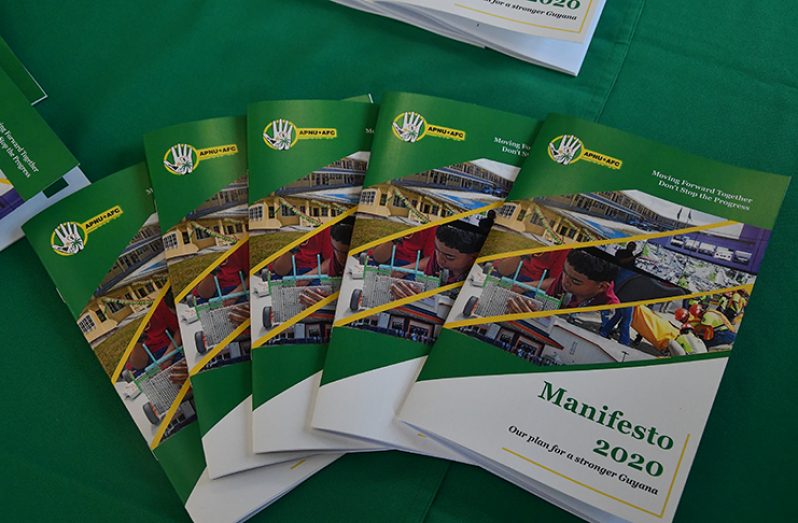-commits to providing technological tools, increasing duty-free allocations for teachers
EDUCATION has been high on the agenda of the incumbent A Partnership for National Unity and Alliance For Change (APNU+AFC) coalition over the past four and a half years, and they have again committed to enhancing the education sector with a number of plans which include modernisation of the existing curriculum.
Subsequent to being elected to office in 2015, the coalition administration had started a National Curriculum Reform, which was conducted under the Guyana Education Sector Improvement Project (GESIP), with the aim of re-engineering success in education at all levels of learning.
The objective of the programme was to improve Guyanese students’ achievements in basic education, to create a balanced 21st century Guyanese curriculum and to strengthen the Guyanese teaching and learning process.
Curriculum reform had become one of the highest priorities in the APNU+AFC government’s sector development programme, and if the coalition is re-elected at the upcoming General and Regional Elections, it has promised to modernise the curriculum and equip teachers with the technological tools to create workers and professionals for the future.
The coalition, in its manifesto, has promised to emphasise science, technology, engineering and mathematics (STEM), which are key elements of a modern curriculum. Part of this also includes a plan to establish an Institute of Information and Communications Technology.
“STEM education has reached unprecedented heights during the first term of the Coalition Government. Numerous schools have been constructed and we have improved the salaries, allowances and stipends of our teachers,” said APNU+AFC in its manifesto.
In addition to the academic and technical programmes, the coalition has also committed to improving national schools of Dance, Drama, Music and Art and increasing support for the Critchlow Labour College.
“Education is the key to economic development and social transformation. Any nation that wishes to stake a credible claim to development must possess a highly developed education system,” said the APNU+AFC coalition.
The coalition has committed to establishing a “first-class” education system which will transform the life of every citizen. The incumbent coalition believes that the creation of an education nation will ensure that every child has the opportunity to attend school and receive a quality education.
Easy access to quality education is an entitlement and is essential to attaining the ‘good life’ for all the people, and the coalition believes that it is through education that young people will be better positioned to make impactful contributions in the world by being creators and innovators.
“Our energies and resources will be invested in the creation of an education nation, affording all children, regardless of socio-economic backgrounds and where they live, similar opportunities to attain their full potential,” said the APNU+AFC.
While the coalition believes that investments in academic and vocational education are important, it also feels that there should be increased measures to ensure that children are encouraged to attend school.
Among the planned measures is the expansion of the Public Education Nutrition Service (PENS), so that all eligible students receive three meals at school on a daily basis, and an expanded Public Education Transportation Service (PETS) to provide increased support for students and disadvantaged persons.
The coalition also plans to ensure that there is equitable and universal access to quality education in rural and hinterland communities. In line with this plan is the proposed establishment of a senior secondary (6th Form) school in the capital town of every region.
There are also plans to improve, expand and establish a system of regional technical institutions in all capital towns.
APNU+AFC also plans to encourage students to undertake courses of study in fields which are critical to the petro-chemical industry, in order to increase local participation in the oil and gas industry from the early stages and ultimately reduce dependence on foreign nationals.
The increased attendance in school is important, but there needs to be an adequate number of teachers to guide and teach these students. So, in recognising this, the coalition has promised to train more teachers in order to improve student-teacher ratios. This will be done by expanding the existing Cyril Potter College of Education (CPCE) campuses and building new campuses in capital towns.
Teachers and education administrators will also be encouraged through increased allocation of duty-free concessions.
It was reported that spending in the education sector had moved from 14.8 per cent of the national budget in 2014 to 17.0 per cent in 2017. And, in 2019, government had invested G$52.2 Billion into the education sector, 15.6 per cent more than in 2018.
In 2019, President David Granger had said that the government is supporting an education policy which is based on the three As – access, attendance and attainment. The overarching educational principle of our education policy is Every Child in School (ECIS).
He had explained that access to education means that sufficient institutions of learning must be available and equipped to impart quality education to everyone, including the visually and physically challenged. “
I would like to see a school in every village, so that children do not have to travel long distances to attend school,” he said.
Additionally, the President said every Guyanese child must have easy access to school by road or river. “I would like to see the villages take greater responsibility for ensuring that every child is enrolled in school; every child attends school regularly; every child graduates from school; and every child is supported in his or her education,” he said.
“I encourage all children to continue to attend school. I believe that through education we can transform our communities and our country. We are on the right path in education.
Real change takes time and I am confident that through the investments which the government, the families and the communities are making in education, we will be able to bequeath to future generations a richer legacy than we inherited,” President Granger said.



.jpg)









